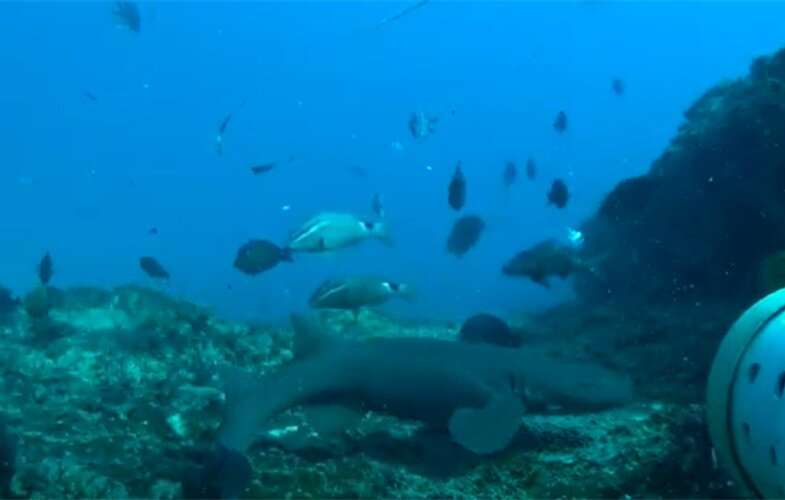#Southern Africa’s most endangered shark just extended its range by 2,000 kilometers

“#Southern Africa’s most endangered shark just extended its range by 2,000 kilometers”

A team of marine scientists led by the Wildlife Conservation Society (WCS) has confirmed that southern Africa’s most threatened endemic shark—the Critically Endangered shorttail nurse shark (Pseudoginglymostoma brevicaudatum) – has been found to occur in Mozambique; a finding that represents a range extension of more than 2,000 kilometers (1,242 miles).
Publishing their findings in the journal Marine Biodiversity, the team said that the discovery was based on several records of the shark including underwater video surveys collected in 2019, recent photos of shore-based sport anglers’ catches, and the identification of a specimen collected in 1967.
The diminutive shorttail nurse shark reaches lengths of approximately 75 centimeters (30 inches). Owing to its strong association with coral reefs, it is under particular threat from overexploitation by coastal fisheries and habitat degradation, and is suspected to have declined by more than 80 percent over the last 30 years.
The scientists say that the findings expand the species range southward from the coast of Tanzania by some 2,200 kilometers (1,367 miles) and 1,100 kilometers (683 miles) westward from Madagascar across the Mozambique Channel.
One of the records of the shark, from Mozambique’s Ponta do Ouro Partial Marine Reserve, suggests that the species benefits from some degree of protection within a large coastal marine protected area (MPA). The authors though warn that the species range within Mozambique may span a large proportion of the country’s unprotected coral reef habitat.
Said Rhett Bennett, WCS Shark and Ray Conservation Program Manager, Madagascar & Western Indian Ocean: “The shorttail nurse shark is under threat within much of its Mozambique range. There are no species recovery plans in place for the species and no specific regulations pertaining to its harvest, other than a listing on the Kenya threatened and protected species list.”
The authors recommend that the species should be considered for legal protection in Mozambique and throughout its limited range. In addition, they say it should be better monitored, and subject to improved management measures to reduce targeted and incidental catch.
WCS works on shark conservation around the world. The majority of the global trade in both shark fins, and other products such as meat, remains unregulated, pushing many species toward extinction. In 2019, at CITES CoP18, WCS helped lead efforts to expand the protection of sharks from unsustainable trade.
The work was conducted in partnership with the Mozambique Instituto Nacional de Investigação Pesqueira, and the South African Institute for Aquatic Biodiversity.
Aspects of this project were funded by the Shark Conservation Fund, a philanthropic collaborative pooling expertise and resources to meet the threats facing the world’s sharks and rays. The Shark Conservation Fund is a project of Rockefeller Philanthropy Advisors.
Silky sharks find hope in Atlantic, remain targets in Indo-Pacific
Rhett H. Bennett et al, Range extension of the Critically Endangered shorttail nurse shark Pseudoginglymostoma brevicaudatum (Orectolobiformes: Ginglymostomatidae) to include Mozambique, with implications for management, Marine Biodiversity (2021). DOI: 10.1007/s12526-020-01137-w
Citation:
Southern Africa’s most endangered shark just extended its range by 2,000 kilometers (2021, January 26)
retrieved 26 January 2021
from https://phys.org/news/2021-01-southern-africa-endangered-shark-range.html
This document is subject to copyright. Apart from any fair dealing for the purpose of private study or research, no
part may be reproduced without the written permission. The content is provided for information purposes only.
If you liked the article, do not forget to share it with your friends. Follow us on Google News too, click on the star and choose us from your favorites.
For forums sites go to Forum.BuradaBiliyorum.Com
If you want to read more Like this articles, you can visit our Science category.



